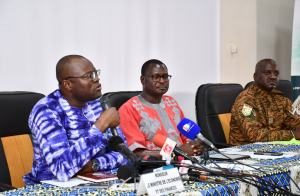AES: A historic initiative to strengthen security in the Sahel region

The newly formed Confederation of Sahel States (AES) is showing a strong commitment to ensuring the security of its member nations. Led by General Assimi Goïta, this organization has already taken a decisive step forward by drafting a joint action plan for defense and security, marking a significant advancement in protecting the populations of Burkina Faso, Mali, and Niger
During the founding summit held in Niamey on July 6, the leaders of these three countries pledged to unite their efforts against the rising security threats in the region.
In response, a strategic plan was developed by military experts under the guidance of senior military leaders: Brigadier General Celestin Simporé for Burkina Faso, Major General Oumar Diarra for Mali, and Brigadier General Moussa Salaoua Barmou for Niger.
Meeting recently in Bamako, military officials reviewed and approved the experts’ recommendations and presented their findings to President Goïta.
He issued clear directives for the swift implementation of the adopted measures, emphasizing the urgent need to secure the AES territories.
“Terrorists, traffickers, and armed groups are not waiting for us,” stressed General Barmou, Niger’s chief of staff, highlighting the immediate need for action.
The action plan focuses on enhancing military coordination among the three nations to effectively counter terrorism, transnational crime, and destabilizing influences.
Large-scale operations are planned as part of this strategy to restore security, enabling citizens to concentrate on their economic and social development.
This initiative reflects a unified strategic vision and strengthened regional solidarity, sending a strong message to those who threaten peace.
The AES member states are resolute in their mission to bring stability to the Sahel.
Public support is crucial to this collaborative effort, and the renewed confidence of the population in their defense and security forces will be a cornerstone of this ambitious project’s success.
Titi KEITA












